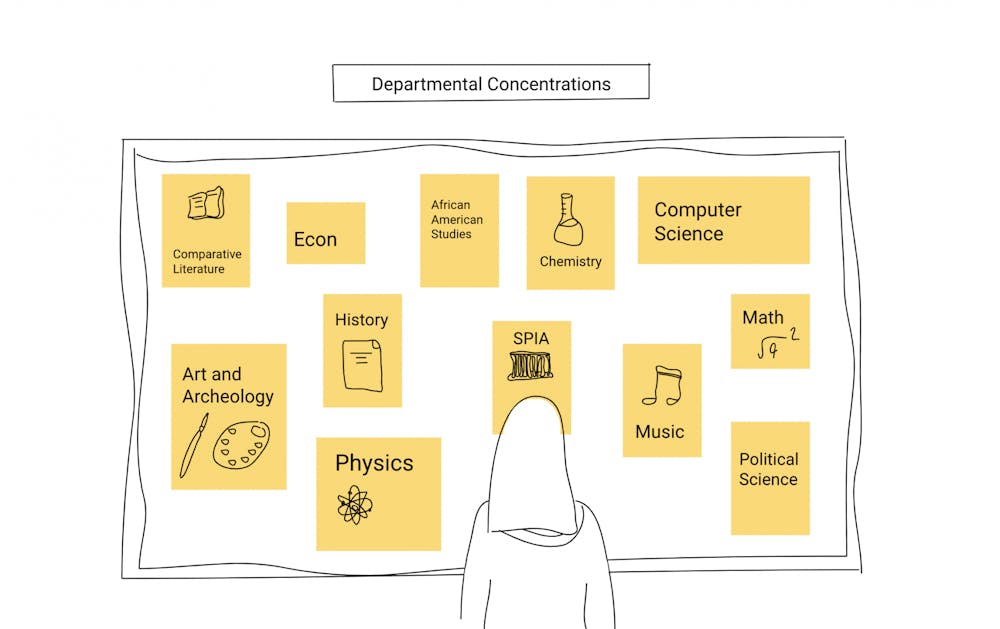In a few months, A.B. sophomores and B.S.E. first-years will find themselves making an important choice: their concentration at Princeton. The prospect of limiting oneself to a specific department can be daunting. Even those like myself who have already chosen their respective concentrations may sometimes lack a sense of belonging. During the pandemic, I’ve found myself reflecting considerably on my path forward and those who have been assisting me along the way. Therefore, I write hoping that this may be helpful to those choosing and those who have already chosen.
As a concentrator in the School of Public and International Affairs (SPIA), I have joined a department that I would describe as intimidatingly large. It is one of the largest in the University, and rightly so. The multidisciplinary approach offered by SPIA requires a concerted effort between diplomats, policymakers, sociologists, economists, historians, and scientists. While this makes for abundant and rich educational opportunities, it can be overwhelming and disorienting. Students are often lost in the sea of options, not knowing what exactly we want to pursue in our various fields nor the people who might assist us best with achieving those goals.
In cases like these, finding my own corner, or specialization, has been a useful approach for me. If you find yourself in a big department, think of ways you can make it your own. Have you taken a course in one very interesting area? See if there are others like it! Pursuing a specific area of study is a great way to discover where you are comfortable within the department.
There is also the added benefit of making connections with professors associated with the field. If you are eager about certain topics, professors will likely notice that and be glad to help you discover more about your interests. This is why I strongly recommend that you go to office hours, even in large lectures, if you really enjoy a course. Even if you don’t necessarily have concrete questions about topics, most professors will be eager to just talk about the course, how it relates to their research, and what gaps in the literature need to be filled. This can be particularly interesting and useful when considering possible topics for independent research.
But maybe “finding your corner” does not quite work for your major. Perhaps the department is structured awkwardly which results in specialization being difficult, with areas of concentration being vague and not very well-defined. In this case I would recommend a different approach: pursuing a certificate.
The various certificates programs contain some of the hidden academic jewels of Princeton’s curriculum. They allow students pursuing a broad field to concentrate in a particular aspect, and in many cases, study a completely separate, secondary field of interest. If you are in a large department and feel lost in the crowd, try looking for small certificate programs in areas that you enjoy.
This is a tactic that I’ve also adopted with SPIA. In addition to specializing in SPIA’s Law and Legal Systems track, I am also obtaining a certificate in Medieval Studies. The Program in Medieval Studies has often been my refuge whenever I’m overwhelmed and saturated by SPIA’s various requirements, events, and somewhat impersonal air. Despite being a small program, it boasts a great variety of resources and an absolutely world-class group of professors, researchers, and graduate students. In environments like these, it is much easier to get to know everyone, faculty and students included.
This increased familiarity has the advantage of transforming learning and advising into a more accessible and personalized experience. It also allows you to bond with a tight-knit group of people that share your passion. I have found that this kind of environment encourages me to be a more independent thinker, spurring me to pursue more projects based on my own ideas and passions. While I have been able to do that in SPIA, I am aware that the department is a more restrictive environment, with less opportunity for personalized teaching and research. I see these kinds of small, interesting certificate programs as ideal environments to turn one’s greatest passions and interests into academic work of exceptional quality. In my view, the type of motivated, self-guided learning that results from partaking in these certificate programs is a more intimate and unparalleled opportunity for growth.

As you embark in the endeavor of choosing — or surviving — a concentration, be cognizant of these tips. Email that one cool professor you had and set up a time to meet or have coffee. Apply to that interesting fellowship you might have seen on a website or in an email — all there is to lose is a couple of hours. Once classes start, we often forget that Princeton’s campus is a place for exploration, not only physically but intellectually. If you start looking through the nooks and crannies of this wonderful academic community, you will have a better chance of finding your home at Princeton.
Juan José López Haddad is a junior in the School of Public and International Affairs from Caracas, Venezuela. He can be reached at jhaddad@princeton.edu.









